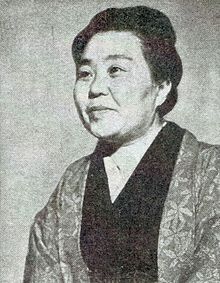Hirabayashi Taiko
Hirabayashi Taiko ( Japanese 平林 た い 子 ; actually: 平林 タ イ Hirabayashi Tai ; born October 3, 1905 in Nagano ; † February 17, 1972 ) was a Japanese writer.
Life
Hirabayashi Taiko attended women's high school against her mother's wishes, but was disappointed with the classes there. It was at this time that she became interested in socialism and the headmaster and poet Tsuchiya Bunmei encouraged her to write.
She went to Tokyo alone and lived with the anarchist Yamamoto Torazō . Both lived for a short time with Torazo's sister in Korea, but soon returned to Tokyo. After the Kanto earthquake , they were arrested and released on condition that they leave Tokyo. They then moved to live with Torazō's brother in Manchuria , where he was arrested and she gave birth to a child at the age of 19 who soon died of malnutrition, after which she returned to Tokyo. This event is also the template for your story Seryōshitsu nite . In other socially critical works, she described the effects of poverty on women's lives.
After the relationship with Torazō had failed, she decided on an intermediary marriage and married Kobori Jinji in 1927 , author of the proletarian literary movement and editor of the magazine Bungei sensen ( literary front ). Imprisoned again for eight months in 1937, she fell seriously ill and was unable to write until 1945. She was temporarily on the board of the left-wing writers' association Literaturgesellschaft Neues Japan .
In 1954, she learned that her husband had a five-year-old daughter with a former domestic servant, which sparked a public debate about their relationship and led to their divorce in 1955. During this time she wrote the autobiographical novel Sabaku no Hana , which describes much of her life and was published in the magazine Shufo no Tomo from 1955 to 1957 .
From 1972 to 1997 the Hirabayashi Taiko Literature Prize (平林 た い 子 文学 賞) was awarded, first by a circle of friends, then by the Kōdansha publishing house .
Works
- 1928 Seryōshitsu nite ( 施 療 室 に て )
- 1946 Mekura chūgoku hei ( 盲 中国 兵 , German blind Chinese soldiers, translated by Asa-Bettina Wuthenow)
- 1946 Hitori yuku ( 一 人 行 く )
- 1946 Kau iu onna ( か う い う 女 )
- 1947 Watakushi wa ikiru ( 私 は 生 き る )
- 1950 Hito no inochi ( 人 の 命 )
- 1967 Himitsu ( 秘密 )
literature
- Berndt, Jürgen (ed.): BI-Lexicon East Asian literatures . 2nd Edition. Bibliographisches Institut, Leipzig 1987, ISBN 3-323-00128-1 .
- Gössmann, Hilaria: Writing as Liberation. Autobiographical novels and short stories by women authors of the Proletarian Literature Movement of Japan . Harrassowitz, Wiesbaden 1996, (Iaponia Insula Volume 4).
- Jentsch, Christian: Hirabayashi Taiko - Azakeru: A text analysis and interpretation in Japanese writers 1890-2006 (Eduard Klopfenstein, ed.) In the journal of the Swiss Asian Society, Asian Studies LXI-2-2007, pp. 327–351, Verlag Peter Lang AG, Bern, ISSN 0004-4717 .
- (EN) Kusakabe, Madoka. " Sata Ineko and Hirabayashi Taiko: The Café and Jokyû as a Stage for Social Criticism " (PhD thesis) ( Archive ( Memento from November 2, 2014 on WebCite )). September 2011. Department of East Asian Languages and Literatures and the Graduate School of the University of Oregon .
Web links
| personal data | |
|---|---|
| SURNAME | Hirabayashi, taiko |
| ALTERNATIVE NAMES | 平林 た い 子 (Japanese); 平林 タ イ; Hirabayashi Tai (real name) |
| BRIEF DESCRIPTION | Japanese writer |
| DATE OF BIRTH | October 3, 1905 |
| PLACE OF BIRTH | Nagano |
| DATE OF DEATH | 17th February 1972 |
